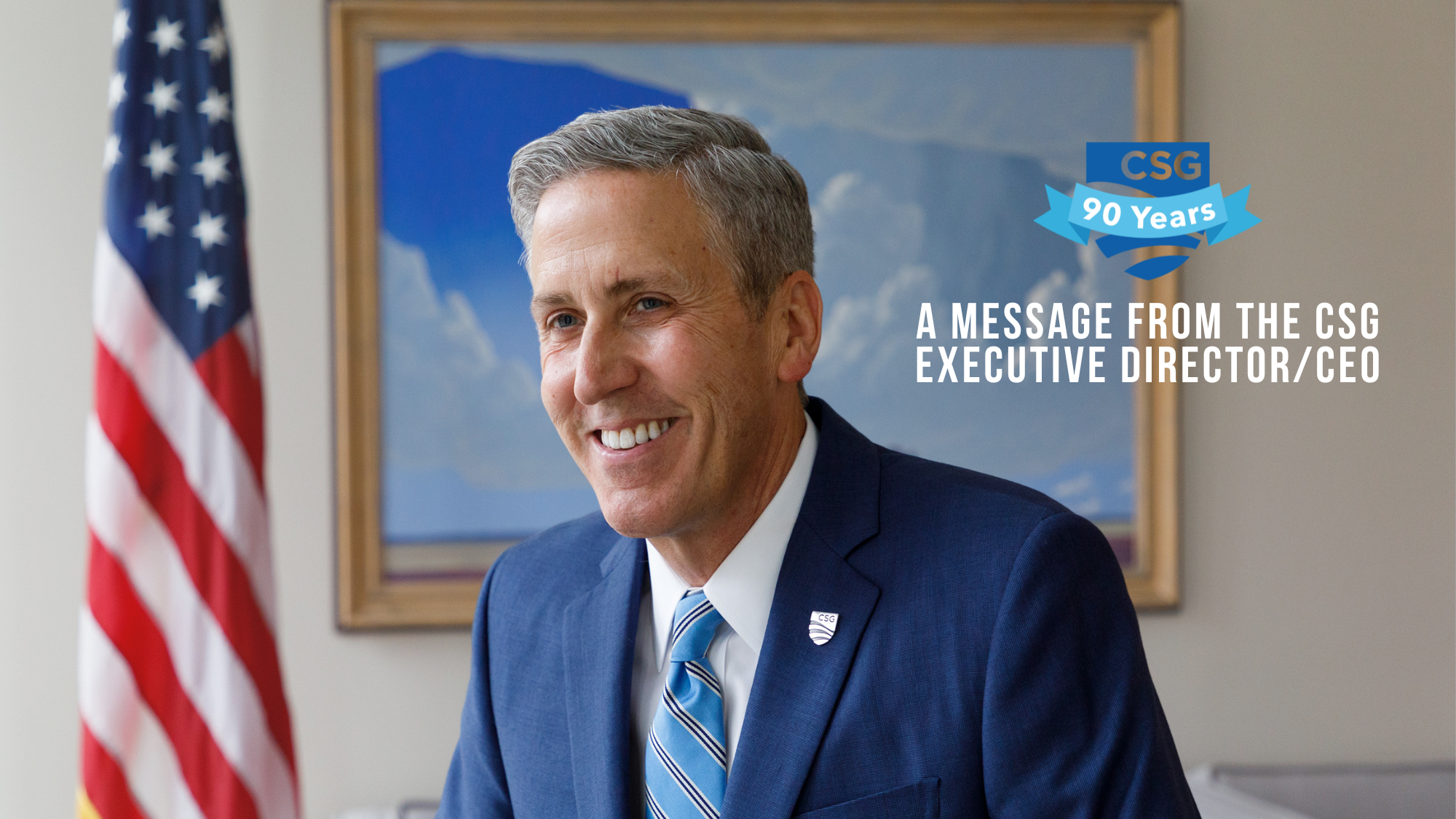For years now, the use of artificial intelligence has been ingrained into the everyday lives of Americans through iPhones, social media and even email platforms. A 2018 study by OpenAI revealed the amount of computational power used for AI training has doubled every year since 2012. Due to AI’s rapid advancement, state policymakers must determine how their states must address the significant regulatory challenges posed by AI.
Continue readingArtificial Intelligence in the States: Harnessing the Power of AI in the Public Sector
As AI systems advance, concerns grow regarding the safety and effectiveness of these tools as well as the potential impacts of these systems on the workforce and the economy. Although private sector uses of AI garner much attention, these systems are also used by the public sector to streamline service provision and support public officials in fields such as law enforcement, elections, transportation, public finance and government administration.
Continue readingThe CSG Henry Toll Fellowship: Toll Fellows on the Impact of the Program
Since 1986, the Henry Toll Fellowship has been an essential part of CSG outreach initiatives. The annual gathering has strived to accelerate growth for each selected participant in their roles as state leaders and public servants. To date, the Henry Toll Fellowship program has vetted more than 1,370 alumni that have gone on to illustrious careers in public policy and beyond.
Continue readingA Q&A with Douglas Brinkley
CSG welcomes Douglas Brinkley as its plenary speaker at the 2023 CSG National Conference in Raleigh, North Carolina. Brinkley is a presidential scholar and history professor at Rice University. He joined CSG ahead of the conference to discuss his personal history and what studying presidents teaches us about leadership.
Continue readingCelebrating 90 Years of Advancing the Common Good
On Oct. 22, 1933, as many as 15 state legislators convened at the Penn Harris Hotel in Harrisburg, Pennsylvania, as part of a shared interest in introducing harmony among the states. CSG Executive Director/CEO David Adkins addressed this meeting and the growth of CSG in a message recognizing the organization’s 90th birthday.
Continue readingWebinar Recap: State Measures to Improve Affordable Housing Access
States across the nation are facing housing shortages resulting in an affordability crisis, and the Northeast is no exception. Fewer new homes are being built now than prior to the Great Recession, according to national findings by Fannie Mae and a regional study by the Regional Planning Association.
As the cost to purchase or rent a home increasingly becomes out of reach for many, income inequality is rising in the United States. Median household incomes also fell in the aftermath of the Great Recession, contributing to a 15-year stagnation. It took until 2015 for median household income to climb back to where it was in 2000 (adjusted for inflation). The widening gap between high-income and low-income earners is being reflected in the market’s behavior. Harvard’s Joint Center for Housing Studies reports that an increasing share of the limited new home construction is being built for the higher-cost market segment.
To unpack these challenges, CSG East hosted an affordable housing webinar on Tuesday, November 14 on “State Measures to Improve Affordable Housing Access.” Opening remarks were delivered by Peggy Bailey, the Vice President for Housing and Income Security at the Center on Budget and Policy Priorities, who highlighted several ways states can influence housing affordability and access: “When it comes to housing, many of those policy choices can be mitigated at the state and local level, policies that can reverse redlining and improve residential integration, that direct resources to affordable housing and community development, and thinking about helping ease the capital costs that it takes to build affordable housing.”
Recommendations to states for improving affordable housing access include the following:
-
- Rental subsidy for low-income workers
- Expanding tenant-based protections to reduce evictions
- Talking with developers about financing challenges
- Addressing zoning laws and advancing inclusionary zoning
- Addressing the burdensome environmental review process
This Giving Tuesday, Help Us Break the Cycle of Incarceration, Uphold Justice, and Offer Second Chances
Ag Labor: Congressional Working Group Releases Interim Report Highlighting Challenges
On April 28 and 29, 2023, members of the CSG East Agriculture and Rural Affairs Policy Committee gathered in Baltimore, Maryland, for a summit to discuss policy options for overcoming the challenges around labor shortages in the farm and food processing sector. At the summit, industry experts and government representatives discussed the problems currently facing the agricultural sector and possible solutions.
Since then, a Congressional Working Group, made up of members of the House Agriculture Committee, has published an interim report on the challenges agricultural producers and processors face in securing a steady and reliable source of labor. The bi-partisan working group, chaired by Congressmen Crawford (R-AK) and Davis (D-NC), issued the report, based on the results of five roundtable sessions and surveys.
An excerpt of the report is published below. Click here to read and download the full report.
Introduction
As Members of the House Committee on Agriculture, we are responsible for the authorization and oversight of federal policies critical to supporting farmers, farmworkers, ranchers, foresters, rural communities, and consumers. We also have a duty to be voices in Congress on issues and policies impacting the livelihoods of these constituencies, even if legislative jurisdiction rests in another committee or committees.
An urgent challenge facing the agricultural sector is producers’ lack of access to an adequate workforce. This has been a problem for decades, and it continues to worsen. Farmers in the U.S. are already reeling from record-high production costs that have translated into thin margins. The inability to find and hire workers is only exacerbating this negative trend.
In the summer of 2023, the House Committee on Agriculture formed the Agricultural Labor Working Group (ALWG) to identify the issues causing the lack of available domestic workforce, the impact this has on our nation’s domestic food supply, and the potential solutions to address this critical challenge. The ALWG has been engaged in a rigorous agenda and has received input from numerous stakeholders, employers, and workers around the country with a specific focus on the H–2A visa program for non-immigrant agricultural workers.
Food security is a national security issue. A large threat to America’s food supply is an unstable workforce available to deliver safe, affordable, and abundant food. This issue deserves the focused attention of the House Committee on Agriculture and the broader Congress and is a necessary undertaking to ensure the success of the agricultural industry for years to come.
Previous efforts to reform the H–2A program have been largely unsuccessful. But that does not mean the effort is over. In the coming months, the ALWG will utilize the information contained in this report, as well as past and future testimonials and information, to develop a final list of policy recommendations to refer to the committee of jurisdiction: the House Committee on the Judiciary.
This report is a summary of what we have heard from various stakeholders, the current state of affairs, and the bevy of issues that farm employers and workers face when utilizing the H–2A program. This report is intended to be a politically neutral document to inform policy makers rather than advocate for particular policy solutions. This report will:
-
- Detail the many complexities and burdens employers and workers face that make the H–2A program more difficult to comply with and administer.
- Cover the pros and cons of the possibility of expanded access to the H–2A program for various sectors, as well as impediments to hiring workers in a timely manner.
- Describe the cost burden employers face and how participation in the program will impact labor expenses and profitability for producers as well as discuss the types of wage possibilities for domestic and foreign workers which may reflect regional and national economic trends.
- Discuss the working and living conditions of H–2A workers, and their relationship with producers that use the program.
- Reference testimonials from farmers, producers, employers, workers, and stakeholders from across the country who have contributed to our ALWG survey.
- Provide a detailed accounting of problems with the H–2A program and the negative impacts these issues are having on our domestic food supply.
Food security is a national security issue. A large threat to America’s food supply is an unstable workforce available to deliver safe, affordable, and abundant food. This issue deserves the focused attention of the House Committee on Agriculture and the broader Congress and is a necessary undertaking to ensure the success of the agricultural industry for years to come.
All of the Above: Ensuring Energy Independence
Recent events, including the COVID-19 pandemic, Russia’s invasion of Ukraine, and lingering supply chain disruptions, have once again highlighted the importance of ensuring the nation’s energy independence. With the push for greater domestic production, states are seeking to expand their portfolios with an “all of the above” energy strategy. Despite its small size, West Virginia is the fifth largest state for energy production. While West Virginia has traditionally been known for coal, the Mountain State has moved to expand its energy portfolio in recent years. In 2022, the Legislature passed bills ending the state’s moratorium on new nuclear energy sites, promoting geothermal energy development, and supporting the use of hydroelectric power. During this two-day Masterclass, participants learned about West Virginia’s energy strategy and ways to emulate and implement these processes in their home states.
Legislators, legislative staff, and agency officials from across the country convened in Wheeling, West Virginia, for the “All of the Above” Policy Masterclass. Twenty-nine participants from 15 states – Alabama, Alaska, Arkansas, Colorado, Kentucky, Louisiana, Mississippi, Missouri, Montana, Nevada, Oklahoma, South Carolina, West Virginia, Wisconsin, and Wyoming – and the Canadian province of Nova Scotia participated in the Masterclass. West Virginia Senate President and Lieutenant Governor Craig Blair, 2023 – 2024 Chair of CSG South, provided pre-recorded opening remarks.
Over three days, participants engaged in programming covering myriad topics related to energy policy. Briefings included topics such as energy security and resilience, federal funding opportunities to strengthen the grid and incentivize local economic development, the future of nuclear energy, permitting policy and reform, carbon capture and sequestration, solar energy and new economy jobs in Appalachia, and the future of energy generation in America. Participants also toured the Alliance Resource Partners’ Tunnel Ridge surface mine and had the opportunity to “choose their own adventure”, opting between an underground mine tour at American Consolidated Natural Resources, or a tour of the MPX Majorsville plant.
Experts from several prestigious organizations briefed attendees, including the following:
- Arnold Ventures
- ACORE
- National Association of State Energy Officials
- HolTec International
- Brookings Institute
- Joseph Rainey Center for Public Policy
- American Petroleum Institute
- Diversified Energy
- Equinox Global Solutions
- Edelen Renewables
- West Virginia Legislature
- Louisiana Legislature
Hosted by CSG South, participants in this Masterclass increased their knowledge of energy policy and examples of state solutions by interacting with subject matter experts and colleagues from across the country.
- Speaker Roger Hanshaw, West Virginia
- Senator Bob Hensgens, Louisiana, Vice Chair, CSG South Energy & Environment Committee
- Senator Mary Boren, Oklahoma
- Assemblywoman Tracy Brown May, Nevada
- Representative Jon Conrad, Wyoming
- Representative Aaron Crossley, Missouri
- Representative Jack Fortner, Arkansas
- Senator Hillman Frazier, Mississippi
- Representative Donna Givens, Alabama
- Delegate Scot Heckert, West Virginia
- Representative Jason Hughes, Louisiana
- Senator Scott Kawasaki, Alaska
- Representative Cathy Kipp, Colorado
- Representative Greg Kmetz, Montana
- Delegate Daniel Linville, West Virginia
- Representative Kevin McDugle, Oklahoma
- Representative Orlando Paden, Mississippi
- Member of Legislative Assembly Iain Rankin, Nova Scotia
- Senator Cody Rogers, Oklahoma
- Delegate George Street, West Virginia
- Representative Lisa Subeck, Wisconsin
- Senator Robin Webb, Kentucky
- Delegate Mark Zatezalo, West Virginia
- Mr. Robert Akers, West Virginia
- Ms. Abby Berquist, South Carolina
- Mr. Jeff Billings, West Virginia
- Ms. Endra Curry, South Carolina
- Mr. Mark Hendrick, South Carolina
- Mr. Zachary Rogers, Arkansas
Presentations:
Photos:
The post All of the Above: Ensuring Energy Independence appeared first on CSG South.
Southern Pulse Newsletter, November 2023
November is a month full of good food, laughter, and a time to reflect on all we are thankful for. As we approach the closure of our fall programming, our office is taking a moment to reflect on the remarkable achievements we’ve experienced, including three outstanding Policy Masterclasses, CALS, SAGE, and our LSA Director’s Group Meeting. Thank you to everyone who attended our programs, and we hope you continue to stay engaged into 2024!
The small yet mighty team at CSG South extends thanks to all our members for the ability to collaborate, network, and build lasting relationships, allowing us to serve as your nonpartisan regional resource. Guided by our values and passion, our team navigates through busy months filled with travel, fall programming, research and writing, and a long list of to-dos. We could not do our work without you and are so blessed!
To all our members, we wish you a peaceful and restful holiday season surrounded by friends and loved ones. We can’t wait to see you again soon!
All the best,
Lindsey G.
Click here to read Southern Pulse- November 2023
The post Southern Pulse Newsletter, November 2023 appeared first on CSG South.







